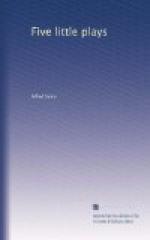CROCKSTEAD. Call it caprice—call it a mere vulgar desire to let my magnificence dazzle you—call it the less vulgar desire to know that my money has made you happy with the man you love.
ALINE. That is generous.
CROCKSTEAD. I remember an old poem I learnt at school—which told how Frederick the Great coveted a mill that adjoined a favourite estate of his; but the miller refused to sell. Frederick could have turned him out, of course—there was not very much public opinion in those days—but he respected the miller’s firmness, and left him in solid possession. And mark that, at that very same time, he annexed—in other words stole—the province of Silesia.
ALINE. Ah—
CROCKSTEAD. [Moving to the fireplace.]
“Ce sont la jeux de
Princes:
Ils respectent un meunier,
Ils volent une province.”
[The music stops.
ALINE. You speak French?
CROCKSTEAD. I am fond of it. It is the true and native language of insincerity.
ALINE. And yet you seem sincere.
CROCKSTEAD. I am permitting myself that luxury to-night. I am uncorking, let us say, the one bottle of ’47 port left in my cellar.
ALINE. You are not quite fair to yourself, perhaps.
CROCKSTEAD. Do not let this action of mine cause you too suddenly to alter your opinion. The verdict you pronounced before was, on the whole, just.
ALINE. What verdict?
CROCKSTEAD. I was the most unpleasant person you ever had met.
ALINE. That was an exaggeration.
CROCKSTEAD. The most repulsive—
ALINE. [Quickly.] I did not say that.
CROCKSTEAD. And who prided himself on his repulsiveness. Very true, in the main, and yet consider! My wealth dates back ten years; till then I had known hunger, and every kind of sorrow and despair. I had stretched out longing arms to the world, but not a heart opened to me. And suddenly, when the taste of men’s cruelty was bitter in my mouth, capricious fortune snatched me from abject poverty and gave me delirious wealth. I was ploughing a barren field, and flung up a nugget. From that moment gold dogged my footsteps. I enriched the few friends I had—they turned howlingly from me because I did not give them more. I showered money on whoever sought it of me—they cursed me because it was mine to give. In my poverty there had been the bond of common sorrow between me and my fellows: in my wealth I stand alone, a modern Ishmael, with every man’s hand against me.
ALINE. [Gently.] Why do you tell me this?
CROCKSTEAD. Because I am no longer asking you to marry me. Because you are the first person in all these years who has been truthful and frank with me. And because, perhaps, in the happiness that will, I trust, be yours, I want you to think kindly of me. [She puts out her hand, he takes it.] And now, shall we return to the ball-room? The music has stopped; they must be going to supper.




